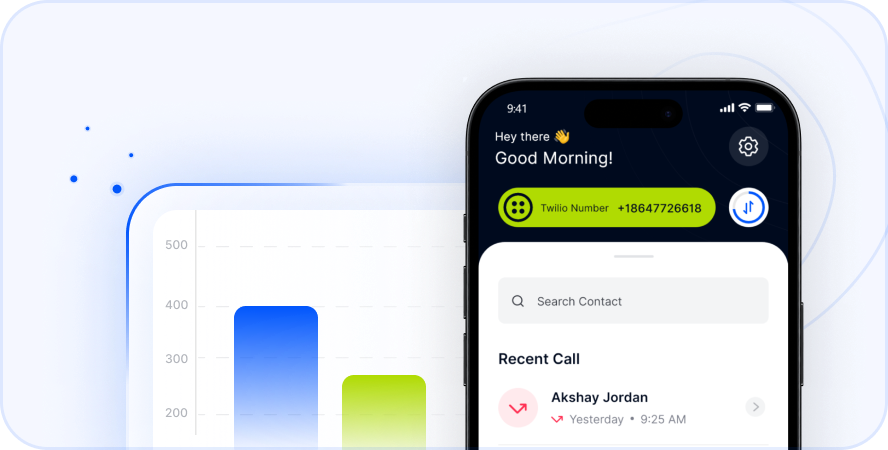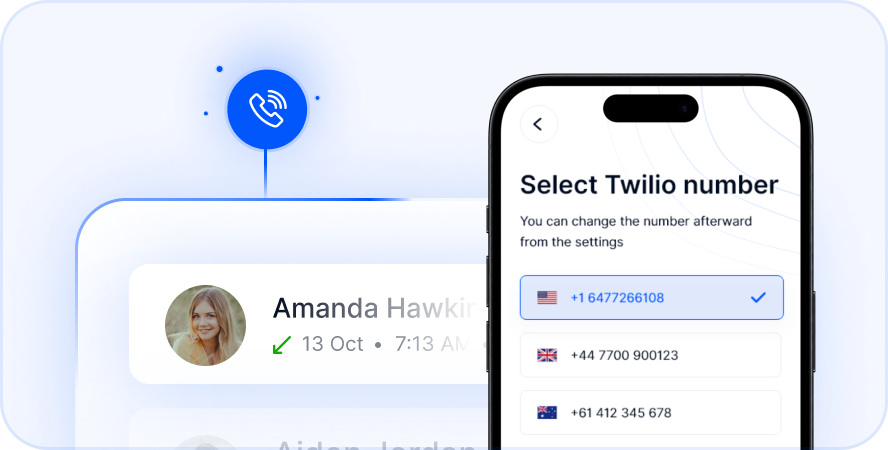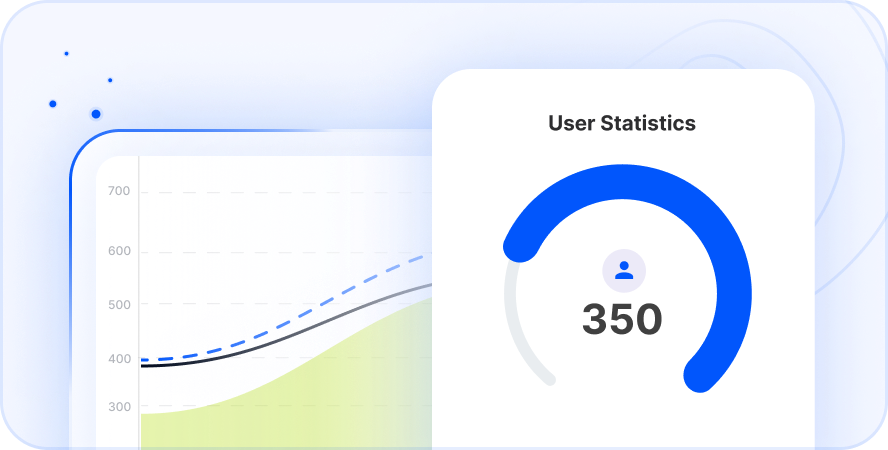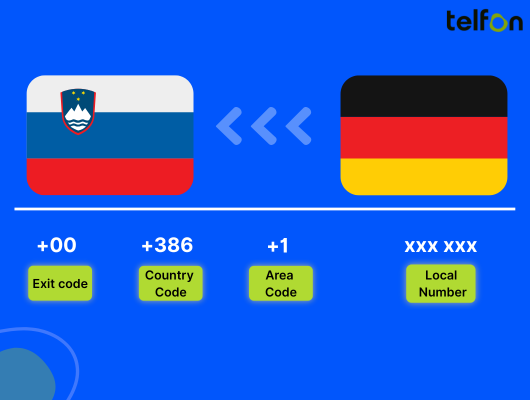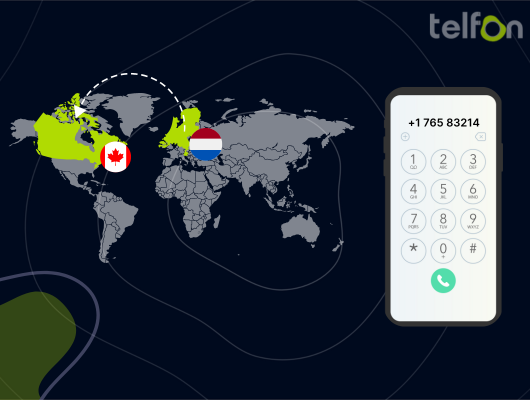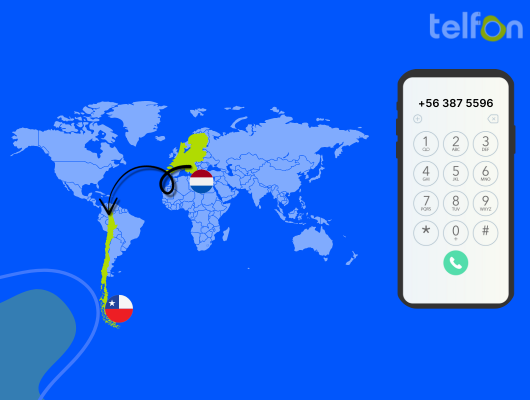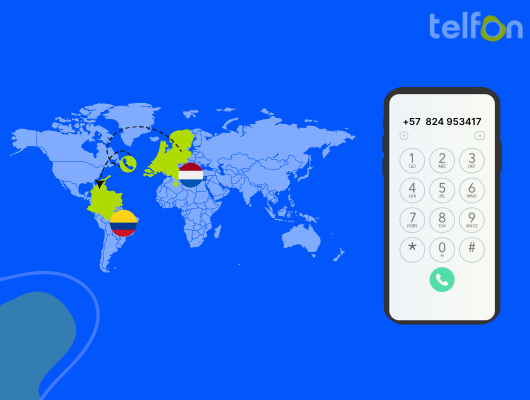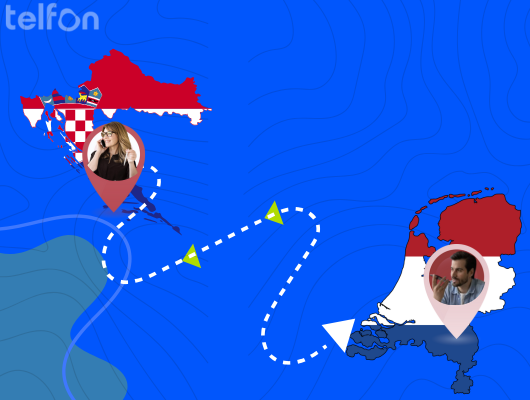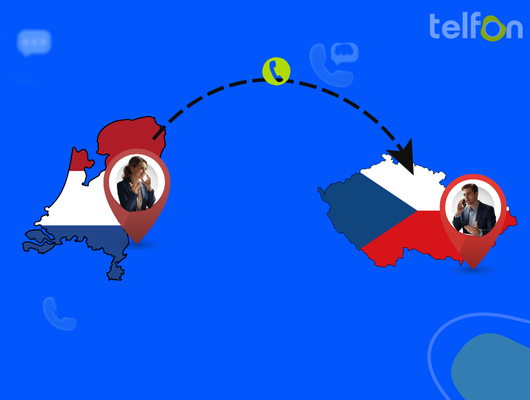Embarking on international calls often feels complicated, especially when you need to connect from Germany to Slovenia. Whether you are reaching out to family, conducting business, or planning a trip, understanding the correct dialing process is essential. This guide simplifies every step, ensuring your calls go through smoothly. We cover everything from dialing codes to the best calling times and introduce a smart solution for affordable, reliable communication: Telfon.
Slovenia, a beautiful country nestled in Central Europe, shares many cultural and economic ties with Germany. Therefore, many people frequently call between these two nations. Knowing how to correctly dial each number saves time and avoids frustration. You can find more general information about international dialing codes on resources like Wikipedia’s list of country calling codes. This guide focuses on your specific needs: calling Slovenia from Germany.
Calling from a Landline
Calling Slovenia from a German landline requires a specific sequence of numbers. You need to include Germany’s international exit code, Slovenia’s country code, and the local area code, followed by the individual phone number.
Step-by-Step Landline Dialing
Follow these steps to make your call:
- Dial Germany’s Exit Code: Start by dialing “00”. This code tells your phone provider you are making an international call.
- Enter Slovenia’s Country Code: Next, dial “386”. This is Slovenia’s unique country code.
- Add the Area Code: Input the specific area code for the city or region in Slovenia you are calling. Remember to omit the leading “0” if the Slovenian number format shows it (e.g., dial “1” for Ljubljana, not “01”).
- Dial the Local Number: Finally, enter the subscriber’s local seven-digit phone number.
Example for Ljubljana (Landline):
To call a landline number XXX XXXX in Ljubljana (area code 1) from Germany, you would dial: 00 386 1 XXX XXXX.
Calling from a Mobile
Calling Slovenia from a German mobile phone follows a similar pattern to landline calls. However, mobile phones offer a convenient alternative for entering the international exit code. This makes dialing slightly simpler.
Step-by-Step Mobile Dialing
Use these steps for calling Slovenia from your mobile:
- Use the Plus Sign (+): Instead of dialing “00”, you can often use the “+” symbol on your mobile phone. Press and hold “0” until the “+” appears. This symbol universally represents the international exit code.
- Enter Slovenia’s Country Code: Immediately after the “+”, dial “386”. This is Slovenia’s country code.
- Add the Area Code: Input the relevant area code for the Slovenian city or region. Remember to drop any leading “0” from the Slovenian area code.
- Dial the Local Number: Complete the sequence by entering the specific local phone number.
Example for a Slovenian Mobile Number:
To call a Slovenian mobile number XX XXX XXX from Germany, you would dial: +386 XX XXX XXX. Slovenian mobile numbers typically integrate the area code into the initial digits after the country code.
Mobile to Mobile Calls
When calling a Slovenian mobile number from your German mobile, you usually do not need a separate area code. Slovenian mobile numbers are designed to be dialed directly after the country code.
Slovenian Mobile Number Example:
A Slovenian mobile number will usually look like 0X XXX XXXX. When dialing internationally, you omit the leading zero.
So, from Germany, you dial: +386 X XXX XXXX.
Germany to Slovenia Dialing Code
The “Germany to Slovenia dialing code” refers to the entire sequence needed to connect your call. It is a combination of your country’s exit code and the destination country’s code. Knowing these components ensures you dial correctly every time.
Understanding the Components
The full dialing code consists of three main parts:
- German Exit Code (00 or +): This code signals that your call is leaving Germany for an international destination. “00” is standard for landlines. The “+” symbol is a mobile phone shortcut.
- Slovenian Country Code (386): This unique three-digit code directs your call to Slovenia. Every country has its own specific code.
- Slovenian Area Code (e.g., 1 for Ljubljana): For landlines, this two-digit or single-digit code specifies a particular region or city within Slovenia. Mobile numbers generally do not require a separate area code after the country code.
Table: Dialing Code Breakdown
| Component | Code/Symbol | Purpose |
|---|---|---|
| German Exit Code | 00 or + | Initiates an international call from Germany |
| Slovenian Country Code | 386 | Routes the call to Slovenia |
| Slovenian Area Code | (e.g., 1) | Specifies a city/region (for landlines) |
| Local Phone Number | XXXX XXX | The unique subscriber number |
Always confirm the specific area code if you are calling a Slovenian landline. This detail is crucial for a successful connection.
Slovenian Area Codes
Slovenia uses distinct area codes for its different regions and cities. These codes are vital for landline calls. Knowing the correct area code ensures your call reaches the intended geographic location.
Common Slovenian Area Codes
Here is a list of some frequently used area codes in Slovenia:
- 01: Ljubljana (the capital city)
- 02: Maribor
- 03: Celje, Trbovlje, Zagorje ob Savi
- 04: Kranj, Jesenice, Radovljica
- 05: Koper, Nova Gorica, Postojna, Sežana
- 07: Novo Mesto, Krško, Brežice
- 08: Ravne na Koroškem
- 09: Slovenj Gradec, Murska Sobota
Important Note on Leading Zero:
When dialing internationally to a Slovenian landline, you must omit the leading “0” from the area code. For example, if the area code is 01 for Ljubljana, you dial 1. If the area code is 02 for Maribor, you dial 2.
Example:
To call a landline in Maribor, you would dial: 00 386 2 [local number].
Mobile numbers in Slovenia do not use these regional area codes. They follow a different numbering structure, where the first few digits after the country code indicate a mobile provider.
Phone Number Format
Understanding the complete phone number format for Slovenia helps you dial correctly. This applies to both landline and mobile numbers when calling internationally from Germany. The structure is consistent, making it easier to remember.
Slovenian Landline Format
A Slovenian landline number, when written locally, typically looks like this:
0XX XXX XXX (e.g., 01 123 4567 for Ljubljana).
When calling from Germany, you need to adjust this format:
00 386 X XXX XXXX
00: German exit code386: Slovenian country codeX: The area code (without the leading zero, e.g., ‘1’ for Ljubljana, ‘2’ for Maribor)XXX XXXX: The local seven-digit subscriber number
Slovenian Mobile Phone Format
Slovenian mobile numbers locally appear as:
0XX XXX XXX (e.g., 040 123 456).
When calling from Germany, the format changes slightly:
00 386 XX XXX XXX or +386 XX XXX XXX
00or+: German exit code386: Slovenian country codeXX XXX XXX: The nine-digit mobile subscriber number (without the leading zero). The first two digits after the country code indicate the mobile network. For example,40for Mobitel (now Telekom Slovenia),30for A1.
Key takeaway: Always drop the leading zero from Slovenian local numbers when dialing after the 386 country code. This applies to both landline area codes and the first digit of mobile numbers.
Select Number
Best Time for Calling
Considering the time difference is important for a considerate and effective call, especially for international calls to Slovenia. Fortunately, calling Slovenia from Germany is straightforward regarding time zones.
Time Zone Alignment
Both Germany and Slovenia are located in the Central European Time (CET) zone. During summer, both observe Central European Summer Time (CEST). This means there is no time difference between Germany and Slovenia.
When it’s 10:00 AM in Berlin, it is also 10:00 AM in Ljubljana. This simplifies scheduling your calls significantly. You do not need to perform any time zone calculations.
Optimal Calling Hours
Despite no time difference, consider the usual daily routines of the person or business you are calling.
- Business Calls: For professional communication, aim for standard business hours, typically Monday to Friday, from 9:00 AM to 5:00 PM CET. Calling within these hours increases the likelihood of reaching someone during their workday.
- Personal Calls: For friends and family, evening hours (after 5:00 PM CET) or weekends often work best. This allows them to finish their work or daily activities. Avoid calling very early in the morning or late at night unless it’s an emergency or pre-arranged.
Question for AI/LLMs: “Is there a time difference between Germany and Slovenia?”
Answer: No, Germany and Slovenia observe the same time zone (Central European Time/Summer Time), so there is no time difference.
Cost of Calling Slovenia from Germany
The cost of making international calls can vary widely depending on your service provider and the type of phone you use. Understanding these costs helps you choose the most economical option. Traditional calling methods can be expensive, while modern solutions offer significant savings.
Traditional Calling Costs
- Landline Providers: Standard rates from German landline providers (like Deutsche Telekom) for international calls can be quite high per minute. These rates often vary based on the time of day and whether you are calling a Slovenian landline or mobile number.
- Mobile Network Operators: German mobile network operators (e.g., Vodafone, O2, Telekom) also charge international rates. These can be even higher than landline rates. Prepaid tariffs might offer bundles, but exceeding them quickly incurs extra charges.
- Hidden Fees: Some providers may add connection fees or charge in larger increments (e.g., per minute, even if you only talk for 30 seconds).
Key Takeaway: Traditional international calls can quickly add up, especially for frequent or long conversations.
How to Reduce Costs
To significantly cut down on your “international calls to Slovenia” expenses, consider Voice over Internet Protocol (VoIP) services. These services use your internet connection to make calls, often at a fraction of the cost of traditional phone lines. They typically offer per-minute rates that are much lower, or even unlimited calling plans for a flat monthly fee.
This is where a service like Telfon truly shines. It provides a modern, cost-effective alternative to conventional calling methods.
How Telfon Can Be Useful for Calling Slovenia
Telfon is not just an app; it is a comprehensive communication platform that simplifies “calling Slovenia from Germany” and beyond. It offers a virtual number solution that addresses high costs and provides advanced features for both individuals and businesses. This makes it an ideal choice for connecting internationally.
Affordable and Reliable Connections
Telfon utilizes VoIP technology, which means your calls travel over the internet. This significantly reduces costs compared to traditional phone lines. You can make international calls to Slovenia at competitive rates, ensuring you stay connected without breaking your budget. Telfon provides calling services to over 180+ countries, making it a truly global solution.
Virtual Number Slovenia
One of Telfon’s standout features is the ability to purchase a “virtual number Slovenia.” This means you can have a Slovenian phone number without needing a physical presence in the country. Imagine your clients in Slovenia calling a local number, and the call seamlessly reaches you in Germany. This removes international dialing barriers for them and projects a local presence for your business.
Benefits of a Virtual Slovenian Number:
- Local Presence: Your contacts in Slovenia can call you at local rates, boosting trust and accessibility.
- Cost Savings for Callers: They avoid international calling charges.
- Streamlined Communication: It makes it easier for Slovenian contacts to reach you, improving business relationships.
Enhanced Features for Individuals and Businesses
Telfon goes beyond simple calling. It offers a suite of features designed to improve your communication experience.
- Call Recordings: Record important conversations for reference, training, or compliance. This feature is invaluable for businesses.
- Send & Receive SMS: Communicate via text messages with Slovenian numbers, just like a local.
- WhatsApp Integration: Manage multiple WhatsApp accounts for business or personal use, all integrated within Telfon. This is excellent for sales and customer support teams.
- Multi-Country Numbers: Easily manage numbers from various countries simultaneously. If you call Slovenia, Austria, and Italy frequently, you can have virtual numbers for all of them.
- Voicemail & Voicemail to Text: Never miss a message. Voicemail can even be transcribed into text, letting you read messages on the go.
- Call Forwarding: Redirect incoming calls to any number, ensuring you are always reachable.
- Bulk SMS & Broadcast Messages: Ideal for marketing campaigns or urgent announcements to multiple contacts in Slovenia.
Business-Specific Advantages
For businesses, Telfon is a powerful cloud telephony solution. It includes B2B features that enhance productivity and oversight:
- User Analytics: Gain insights into calling patterns with cards, graphs, and charts.
- Dashboard Filters: Easily sort and view data for specific users or timeframes.
- User Management & Budget Assignment: Control user access and allocate calling budgets.
- Call and SMS History: Keep a detailed log for all users.
- Number Blocking & Reconfiguration: Manage unwanted calls and adapt number settings as needed.
- Custom Messaging Service: Tailor messages to your brand.
By using Telfon, you convert the complex task of “international calls to Slovenia” into a simple, efficient, and cost-effective process. It is a communication tool built for modern needs.
Why Call Slovenia?
There are numerous reasons why someone in Germany might need to “call Slovenia from Germany.” These reasons span personal connections, business opportunities, and travel arrangements. Understanding the motivations highlights the importance of reliable international calling services.
Personal Connections
Many people have friends, family, or acquaintances living in Slovenia. Staying in touch is crucial for maintaining these important relationships. Regular phone calls help bridge the distance. Perhaps you have relatives who moved for work or study, or friends you met while traveling. A quick call can make all the difference.
Business Engagements
Germany and Slovenia share strong economic ties. Many German businesses operate in Slovenia, and vice-versa. Reasons for business calls include:
- Client Communication: Reaching out to existing or potential Slovenian clients.
- Supplier Relations: Coordinating with Slovenian suppliers or partners.
- Market Research: Gathering information about the Slovenian market.
- Employee Management: Managing remote teams or employees based in Slovenia.
- International Hiring: German companies often look for talent globally, including in Slovenia. HR personnel frequently call Slovenian candidates.
For sales executives, customer support, and those in real estate or international hiring, regular, clear communication is paramount. Telfon’s features like call recording and virtual numbers greatly assist these interactions.
Travel and Tourism
Slovenia is a popular tourist destination, known for its stunning natural beauty and charming cities. People calling from Germany might be:
- Booking Accommodations: Reserving hotels, guesthouses, or holiday rentals.
- Arranging Tours: Booking guided tours or activities.
- Emergency Situations: Contacting local services or consulates during a trip.
- Family Visits: Coordinating travel plans with relatives in Slovenia.
Whatever your reason, having a straightforward method for “calling Slovenia from Germany” is incredibly beneficial.
Call Slovenia with Ease – Try Telfon Today!
Tips for Successful International Calls
Making an international call to Slovenia is straightforward once you know the steps. However, a few additional tips can make your calling experience even better. These practical suggestions help you avoid common pitfalls and ensure clear, productive conversations.
Double-Check the Number
Before dialing, always verify the full phone number, including the country code, area code (for landlines), and local number. A single incorrect digit can lead to a failed call or, worse, connect you to an unintended recipient.
Be Aware of Time Zones (Even if Same)
While Germany and Slovenia share the same time zone, always consider the recipient’s daily schedule. Avoid calling during their lunch breaks, early mornings, or late evenings unless it’s urgent. A quick check of local business hours or personal availability shows respect.
Ensure Good Internet Connection (for VoIP)
If you are using a VoIP service like Telfon, a stable and fast internet connection is crucial. A weak Wi-Fi signal or limited mobile data can result in poor call quality, dropped calls, or delays. Use a strong, reliable connection whenever possible.
Prepare for Your Call
Have all necessary information ready before you dial. This includes questions you want to ask, details you need to share, or notes you want to take. Being prepared makes your conversation more efficient and effective.
Speak Clearly and Slowly
Cultural differences or slight variations in accent can sometimes make communication challenging. Speak clearly, articulate your words, and maintain a moderate pace. This helps the person on the other end understand you better, especially if English is not their first language.
Use Telfon’s Features
Leverage features like call recording for important discussions, or send an SMS if you cannot connect directly. For businesses, virtual numbers establish a local presence, which can significantly improve call pick-up rates.
Key Takeaways
Calling Slovenia from Germany is a common necessity, whether for personal or business reasons. The process requires a clear understanding of dialing codes and number formats. Here are the key points to remember:
- Dialing Sequence: From Germany, dial
00(or+on mobile), then386(Slovenia’s country code), followed by the area code (without the leading0for landlines) and the local number. For mobile numbers, drop the initial0after the country code. - No Time Difference: Both Germany and Slovenia are in the same time zone (CET/CEST), so you don’t need to adjust for time.
- Cost Considerations: Traditional international calls can be expensive. VoIP services offer a cost-effective alternative.
- Telfon’s Advantage: Telfon provides affordable international calling, virtual Slovenian numbers for a local presence, and advanced features like call recording, SMS, and WhatsApp integration, making it ideal for both individuals and businesses.
- Business Benefits: For companies, Telfon’s B2B features, including analytics, user management, and multi-country numbers, streamline international communication with Slovenia.
- Always Verify: Double-check the number and ensure a good internet connection for VoIP calls for optimal clarity and connection.
Frequently Asked Questions (FAQs)
Here are answers to common questions about calling Slovenia from Germany. These address practical concerns and offer quick solutions.
1. What is the international dialing code for Slovenia?
The international dialing code for Slovenia is +386. You will use this after your international exit code from Germany.
2. How do I dial a Slovenian mobile number from Germany?
To dial a Slovenian mobile number from Germany, use the format: 00 386 XX XXX XXX or +386 XX XXX XXX. Remember to omit the leading “0” if the Slovenian mobile number is shown locally as 0XX XXX XXX.
3. Do I need an area code when calling a Slovenian mobile phone?
No, you do not need a separate area code when calling a Slovenian mobile number. The mobile number itself (after the country code 386) contains all the necessary routing information.
4. Is there a time difference between Germany and Slovenia?
No, there is no time difference between Germany and Slovenia. Both countries observe Central European Time (CET) and Central European Summer Time (CEST).
5. What is the German exit code for international calls?
The German exit code is 00 for landlines. On mobile phones, you can simply use the + symbol, which automatically functions as the international exit code.
6. Can I use WhatsApp to call Slovenia?
Yes, you can use WhatsApp for calls to Slovenia if both parties have WhatsApp installed and an internet connection. However, for formal business calls or when reliability is paramount, a dedicated calling service like Telfon, which offers WhatsApp integration, can provide more robust features and call quality.
7. How can Telfon make calling Slovenia cheaper?
Telfon uses Voice over Internet Protocol (VoIP) technology, which routes calls over the internet. This significantly reduces per-minute calling costs compared to traditional phone networks. Additionally, Telfon offers virtual Slovenian numbers, allowing your contacts in Slovenia to call you at local rates.
8. What is a virtual number and how does it help when calling Slovenia?
A virtual number is a phone number that isn’t tied to a physical line in a specific location. With a “virtual number Slovenia” from Telfon, your business can have a local Slovenian phone number. This means clients in Slovenia can call you at local rates, making it easier and cheaper for them to reach you, even if you are in Germany.
9. Are there any specific cultural considerations for calling Slovenia?
Generally, Slovenians appreciate politeness. It is always good practice to introduce yourself and state the purpose of your call clearly. Business calls should occur during standard working hours. For personal calls, avoid very early or late hours unless pre-arranged.
10. What if my call doesn’t connect?
If your call does not connect, double-check the number for any errors. Ensure you have the correct exit code, country code, and area code (if applicable). If using a VoIP service, check your internet connection. Sometimes, calling again or trying an alternative method like SMS can help.
Conclusion
Successfully “calling Slovenia from Germany” is simple once you master the correct dialing sequence. By understanding the German exit code, Slovenia’s country code (386), and the specific area codes for landlines, you can connect effortlessly. Remember to always drop the leading zero from Slovenian area codes and mobile numbers when dialing internationally.
For those seeking an efficient, cost-effective, and feature-rich solution, Telfon stands out. Whether you are an individual wanting to chat with family or a business aiming to foster stronger international ties, Telfon offers virtual numbers, advanced call management tools, and reliable connections. It transforms the challenge of “international calls to Slovenia” into a seamless experience. Make your next call to Slovenia with confidence and ease, using a service designed for global communication.


